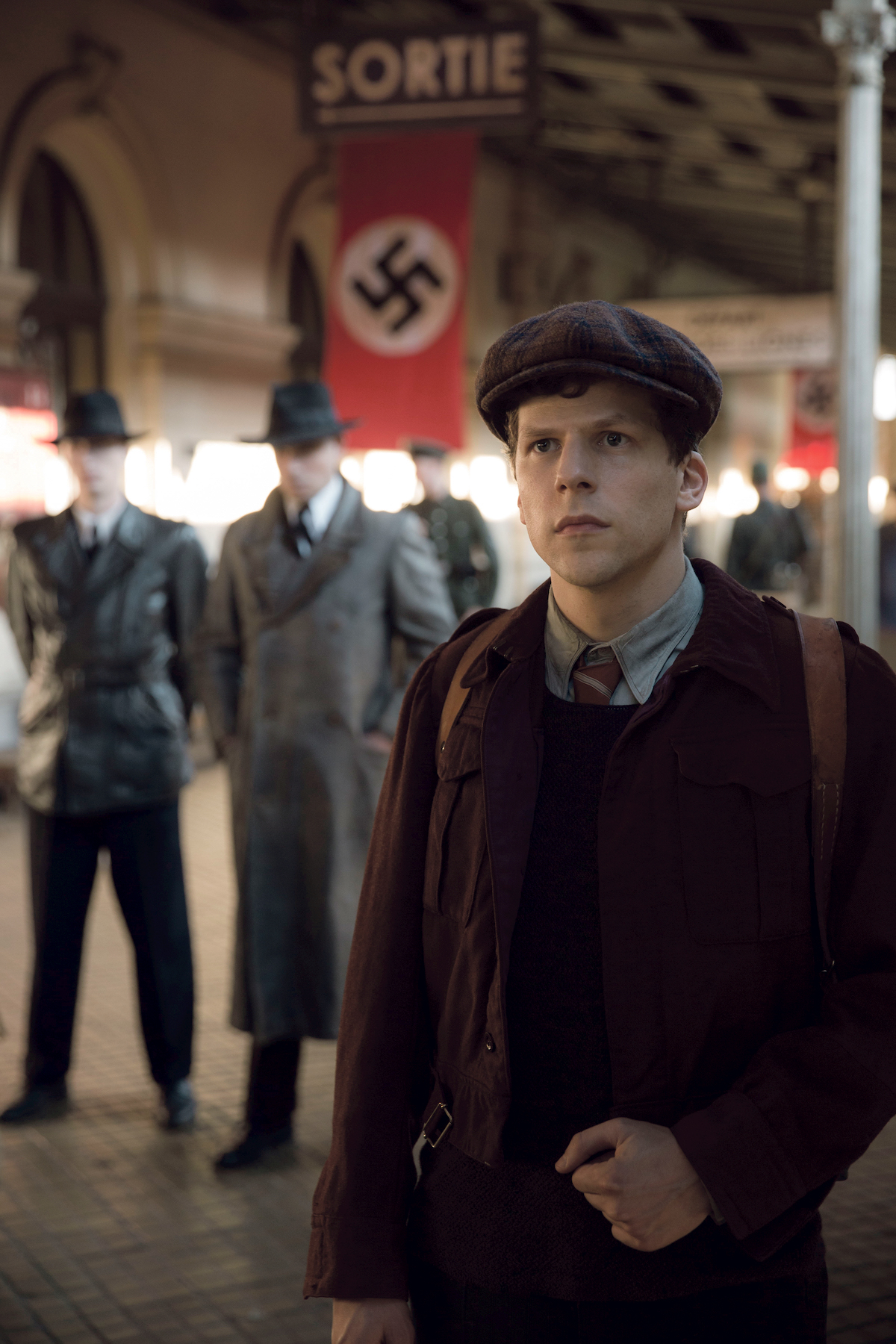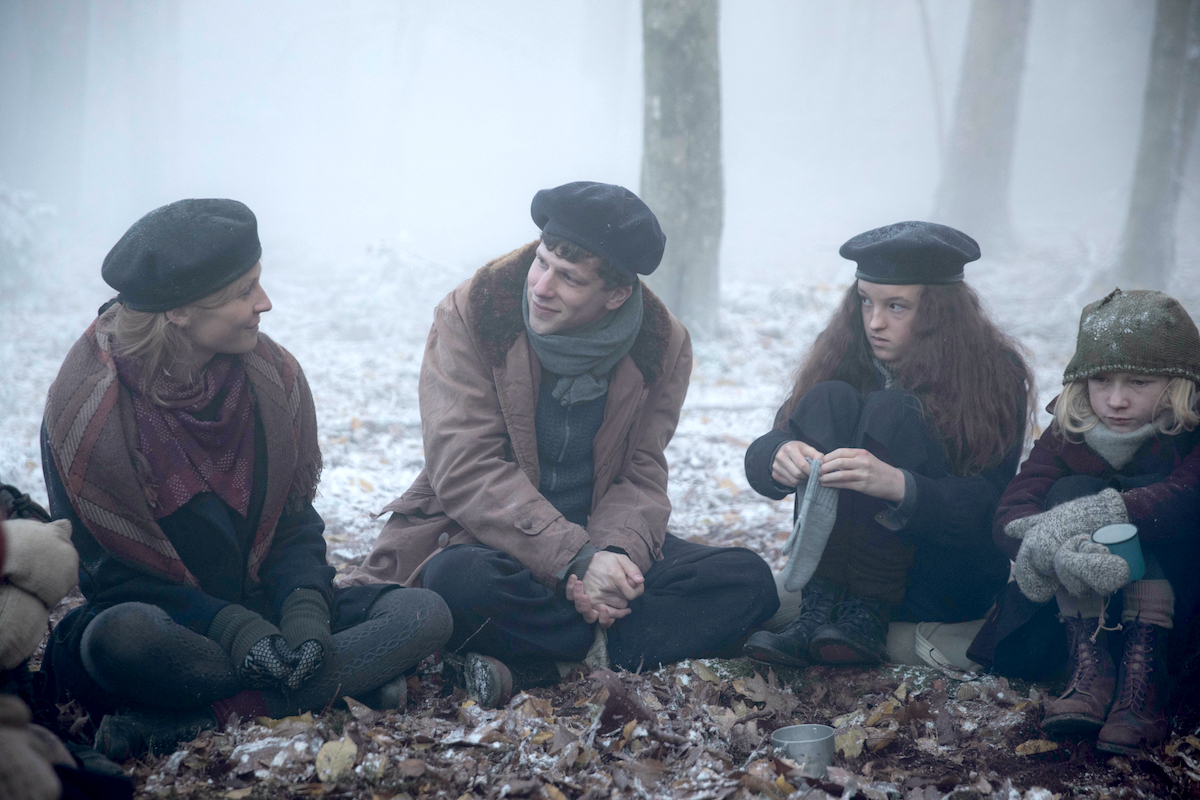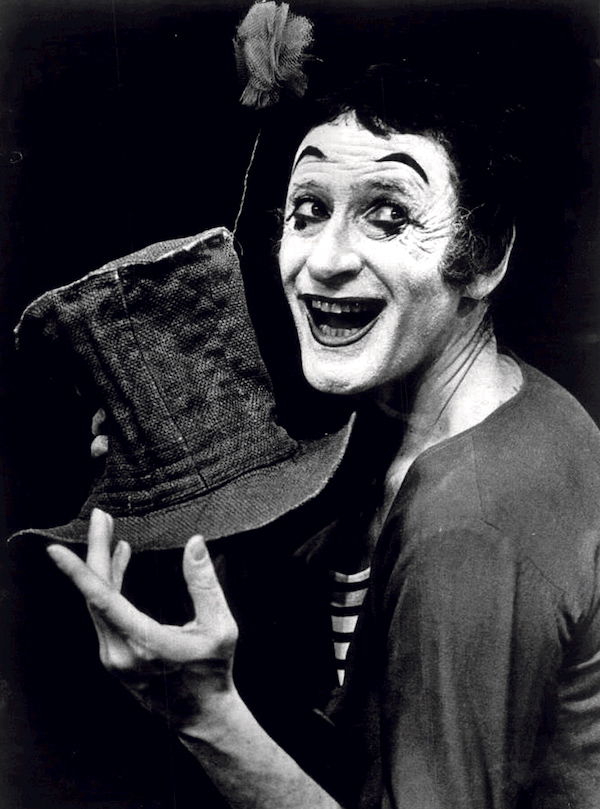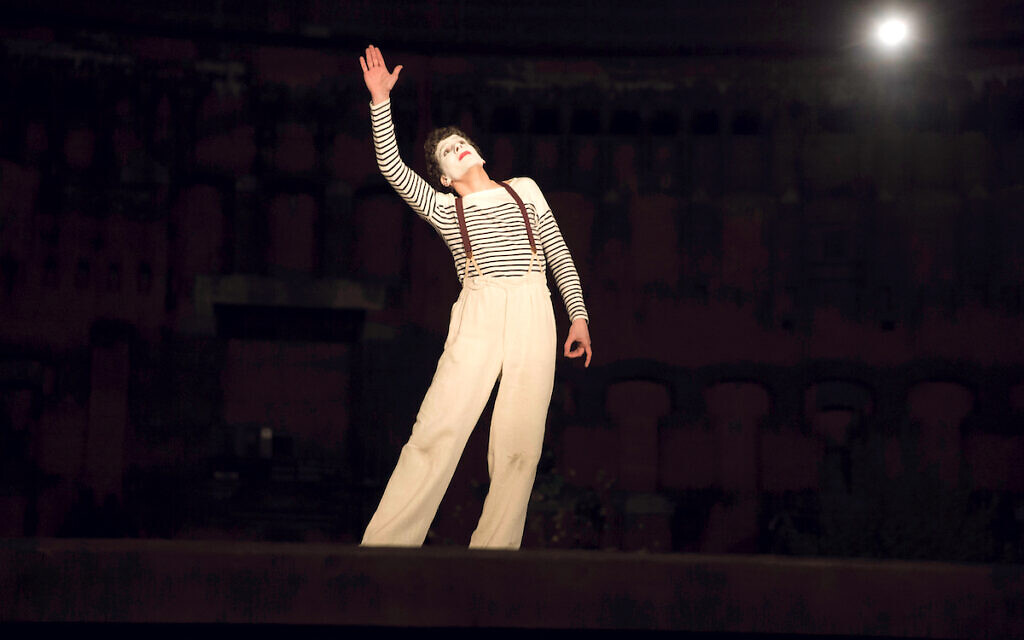The mime of his life! Jesse Eisenberg on playing Marcel Marceau in Resistance
Stephen Applebaum speaks to the Hollywood star about director Jonathan Jakubowicz's latest film exploring the wartime heroics of the French-Jewish artist
Jesse Eisenberg was nothing less than “shocked” when he compared pictures of himself and the famous French mime artist Marcel Marceau, because their alikeness was “too uncanny”.
Digging further, he discovered that Marceau’s father came from a town in Poland “an-hour-and-a-half” from where his own family originated.
“So,” he tells me by phone from New York, “we must have very similar genetics.”
Get The Jewish News Daily Edition by email and never miss our top stories Free Sign Up
There was more. His mother used to be a party clown and was “over the moon” when she heard he had landed the lead role in writer-director Jonathan Jakubowicz’s latest project, Resistance, which explores the wartime story of Marceau, who was Jewish.
“She said, ‘I looked like Marceau!’ She’d painted her face to look like him her whole career and I had never put that together.”

Playing a Jewish lead might have made Eisenberg think twice at a time in the past when he was concerned about becoming “boxed in”.
“I have certain characteristics that come across as particularly Jewish,” he says, “and when you’re in a movie, whatever characteristics you have, irrespective of your attempt to hide them, emerge, because it’s an incredibly intimate medium.”
Although he has played some identifiably Jewish characters – most notably Mark Zuckerberg in The Social Network, and a Chasid in Holy Rollers – he says that when he was starting out, he’d be sent scripts with parts that were “coded as Jewish, like the thin virgin who’s the punchline or something. I just hated those things”, he spits.
“To me they were not only stupid roles, but a bit offensive, from a cultural perspective. So, I guess I was more hesitant to play explicitly Jewish roles; I thought it would be limiting as an actor.”
That was then. Today, “we’re in a wonderful place in our culture,” declares Eisenberg.
“I’m in a similar place in my own psyche, which is we don’t have to be in denial.
“We can depict different cultures in the media, which is respectful to the culture and empowering. Those kinds of tropes that I would say were stuck in 90s comedies are not accepted in the culture anymore as funny or entertaining. And thank God.”

Marceau’s story, as told in Resistance, is one of empowerment. Jakubowicz’s focus is not just on Marceau as a blossoming artist, but as a Jew who helped hundreds of Jewish children escape from Nazi-occupied France.
This was key for Eisenberg. He refers to Schindler’s List as an important film in his education about the Shoah, but while that was “a great movie” made by a Jewish film-maker – Steven Spielberg – its hero was a “rich, tall, attractive German businessman who finds it in his heart to save these emaciated victims”.
“It humanises Jewish people,” he says, “but it doesn’t empower them.”
Resistance, on the other hand, creates a Jewish saviour who is “heroic on his own terms”, using ways that are “artistic, clever, fantastic” to outwit the Nazis.
Mime, Marceau tells children under his protection, is about making that which is invisible visible and, likewise, that which is visible invisible.
It appeals to the imagination of performer and audience alike and is shown as something simultaneously sophisticated and childlike.
Did Eisenberg, now a father of a three-year-old son, with wife Anna Strout, have a strong imaginative life as a boy?
“I was funny, but incredibly quiet and very shy, and I hated any kind of social gatherings,” he says. “I didn’t go to any birthday parties or anything. I probably had a strong imagination, but it came from a place of feeling really on the outside of normal life.
“I always just knew: ‘Once I’m an adult, I’m going to be home free, but this is just torment.’ I hated being a child. So yeah, I developed a rich imagination. But it certainly wasn’t something that was winning friends at that age.”

In Resistance, Marceau uses his art to break through the children’s trauma and, momentarily, pull them out of their grief. There’s a lovely scene where he playfully interacts with the youngsters and something real and magical seems to be happening between them. It was a special moment, Eisenberg confirms.
“You can imagine, after spending seven months learning the same routine over and over in my bedroom alone, to perform for these kids was just so illuminating.
“It made me realise, if this scene happened in real life, the joy it must have brought Marcel Marceau, who spent his fledgling career performing in dive bars for unappreciative adults. I could imagine this just gave him purpose for his work in a completely new way.”
That purpose is evident in a scene shot in Congress Hall in Nuremberg. In this vast, unfinished arena for Nazi rallies, Marceau/Eisenberg gives a transportive, elegiacal performance for US troops, that silently combines pathos with anger. I ask him how he felt as a Jew in that space.
“It was amazing just to go in there, let alone perform there,” he says.
“But, more broadly, it was a real, unusual and wonderful victory that this hall was to be completed when the destruction of the Jewish people was completed, and not only did both of those things not happen, but here we are performing a movie inside it about a Jewish hero.
“If the Nazis are alive somewhere, or looking down, I can imagine nothing as discouraging as the image of movie cameras rolling on that scene, in that building.”
- Resistance (15) will be available to stream on Amazon Prime Video from tomorrow (Friday)
- It is available on UK Jewish Film On Demand this Friday: https://ukjewishfilm.org/ondemand/faqs/

Thank you for helping to make Jewish News the leading source of news and opinion for the UK Jewish community. Today we're asking for your invaluable help to continue putting our community first in everything we do.
For as little as £5 a month you can help sustain the vital work we do in celebrating and standing up for Jewish life in Britain.
Jewish News holds our community together and keeps us connected. Like a synagogue, it’s where people turn to feel part of something bigger. It also proudly shows the rest of Britain the vibrancy and rich culture of modern Jewish life.
You can make a quick and easy one-off or monthly contribution of £5, £10, £20 or any other sum you’re comfortable with.
100% of your donation will help us continue celebrating our community, in all its dynamic diversity...
Engaging
Being a community platform means so much more than producing a newspaper and website. One of our proudest roles is media partnering with our invaluable charities to amplify the outstanding work they do to help us all.
Celebrating
There’s no shortage of oys in the world but Jewish News takes every opportunity to celebrate the joys too, through projects like Night of Heroes, 40 Under 40 and other compelling countdowns that make the community kvell with pride.
Pioneering
In the first collaboration between media outlets from different faiths, Jewish News worked with British Muslim TV and Church Times to produce a list of young activists leading the way on interfaith understanding.
Campaigning
Royal Mail issued a stamp honouring Holocaust hero Sir Nicholas Winton after a Jewish News campaign attracted more than 100,000 backers. Jewish Newsalso produces special editions of the paper highlighting pressing issues including mental health and Holocaust remembrance.
Easy access
In an age when news is readily accessible, Jewish News provides high-quality content free online and offline, removing any financial barriers to connecting people.
Voice of our community to wider society
The Jewish News team regularly appears on TV, radio and on the pages of the national press to comment on stories about the Jewish community. Easy access to the paper on the streets of London also means Jewish News provides an invaluable window into the community for the country at large.
We hope you agree all this is worth preserving.
-
By Brigit Grant
-
By Laurent Vaughan - Senior Associate (Bishop & Sewell Solicitors)
-
By Laurent Vaughan - Senior Associate (Bishop & Sewell Solicitors)
-
By Laurent Vaughan - Senior Associate (Bishop & Sewell Solicitors)
-
By Laurent Vaughan - Senior Associate (Bishop & Sewell Solicitors)






















